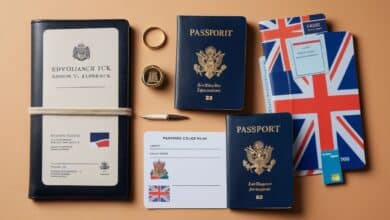Marriage Visa and Work Visa Sponsorship in Italy: A Complete 2025 Guide
Recent policy shifts have transformed how non-European nationals reunite with relatives in Italy.
Since June 2024, those seeking to join Italian or EU family members must follow updated procedures through the National Visa system. This pathway remains critical for establishing long-term residency through marital or civil union relationships.
The CIVES digital platform now centralizes application submissions, replacing older paper-based methods. This change improves accessibility for global applicants while maintaining rigorous verification standards. Processing durations now vary more significantly based on an individual’s nationality and existing residency status.
Careful preparation proves vital when navigating these updated requirements. New fee structures and document authentication rules demand meticulous attention to detail. Applicants must distinguish between temporary entry permits and permanent residence options early in their planning process.
South African citizens should note specific regional considerations in the application workflow. Legal advisors emphasize understanding country-specific processing timelines and relationship evidence requirements. Proper documentation organization often determines success rates in these family-oriented immigration cases.
Understanding the Italian Visa Landscape
For non-EU nationals, Italian law provides structured options to unite with family members under specific conditions. The framework balances national legislation with European Union directives, creating predictable pathways for those seeking to establish family life in the country.
Overview of National Visa for Family Reasons
This authorization serves as the primary method for relatives of Italian or EU citizens to obtain legal status. Two distinct processes exist: reunification for separated families and settlement for those relocating together. Each path carries unique documentation requirements and processing timelines.
Applications must be filed through consulates corresponding to the applicant’s current legal residence. This jurisdictional rule prevents forum shopping and ensures standardized evaluation across regions. South African applicants often benefit from streamlined processing when submitting through Pretoria’s diplomatic office.
Legal Context and Jurisdiction
Recent legislative changes emphasize sustained relationship verification. Couples must provide continuous evidence of their union from application through naturalization. Authorities now cross-reference multiple data sources to confirm marital authenticity.
The system aligns with EU Directive 2003/86/EC while preserving Italy’s specific integration standards. Temporary permits require annual renewal, whereas permanent residence becomes accessible after five years of continuous legal stay. Legal experts recommend maintaining organized records of all family-related documents throughout this period.
Visa Sponsorship and Marriage Visa in Italy: Eligibility Details
Italy’s family reunification policies establish clear pathways for couples seeking long-term residency. Legal frameworks prioritize maintaining family unity while ensuring compliance with national integration standards.
Who Can Apply: Non-EU Nationals and Family Members
Foreign partners of Italian citizens gain citizenship eligibility after three years of continuous marriage. This period shortens to 18 months for couples raising biological or adopted children. “Documentation proving genuine relationships remains crucial throughout the process,” notes a Milan-based immigration attorney.
Eligibility extends beyond spouses to include dependent parents and unmarried children under 21. Adult children with disabilities or elderly parents requiring financial support may qualify under special provisions. South African applicants should verify regional consulate requirements for additional documentation.
Specific Criteria for Marriage and Civil Unions
Civil union partners receive identical rights to married couples under Italian immigration law. Both relationship types require proof of shared residence and financial interdependence. Authorities cross-check tax records, lease agreements, and communication histories during evaluations.
The continuity rule mandates maintaining marital status until naturalization completion. Couples must submit annual updates to immigration offices, including recent joint financial statements. Children from previous relationships gain accelerated residency approval when one parent holds Italian citizenship.
Step-by-Step Application Process
Italy’s digital transformation of immigration procedures has streamlined family reunification requests through standardized online systems. The CIVES platform now serves as the primary gateway for managing submissions, replacing outdated manual processes.
How to Apply Online Through Official Portals
Creating an account requires precise alignment between registration details and birth certificates. Married women must use maiden names exactly as shown on original documents. The system locks profiles after three unsuccessful verification attempts, requiring consular assistance to reset.
Registration and Profile Verification
Secure credentials involve a two-step authentication process. Applicants receive SMS codes to confirm mobile numbers during initial setup. Profile activation typically takes 2-3 business days as officials cross-check data against national registries.
Submission and Payment Protocols
Document uploads follow strict technical requirements:
- PDF files under 5MB for text documents
- JPG/PNG formats for identification pages
- Certified translations for non-Italian materials
The PagoPA system processes credit card payments instantly, while international transfers may take 5-7 working days. Applicants receive tracking codes upon successful submission, essential for monitoring case progress through consular channels.
Required Documents and Fees
Accurate documentation forms the cornerstone of successful family reunification applications. Submitting complete files with proper authentication prevents delays and rejections. Authorities verify every detail against national databases, making precision essential.
Comprehensive Document Checklist
Applicants must provide original or apostilled materials with certified Italian translations. Key requirements include:
- B1 language certificates from approved institutions like Dante Alighieri Society
- Long-form birth records with dual apostilles for non-EU countries
- Criminal clearance from every residence since age 14, valid six months
Marriage certificates require the atto integrale format from Italian municipalities. Canadian residents submit work permits alongside passports, while South Africans need additional birth registration verification.
Detailed Fee Structure and Payment Methods
Costs vary based on application type and submission date:
- €250 citizenship fee via PagoPA or Poste Italiane transfer
- Stamp duty waived for filings after December 2024
Canadian applicants pay extra for RCMP fingerprint processing. “Missing one apostille can reset the entire timeline,” warns a Rome-based documentation specialist. Digital payments receive instant confirmations, while international transfers take five business days.
Conclusion
Securing legal status through family connections demands precision at every stage. Applicants must verify all certificates and translations meet consular standards before submission. Even minor errors in documentation can extend processing timelines by months.
Financial planning proves critical when budgeting for application fees, translations, and mandatory certifications. Families with children often benefit from accelerated eligibility but face stricter evidence requirements for dependents. Regional variations in jurisdiction create significant differences in approval dates.
The path from temporary status to permanent residence spans several years of consistent compliance. Recent legislative updates emphasize maintaining genuine relationships throughout this period. South African applicants should prioritize consultations with specialists familiar with Pretoria’s specific requirements.
Proactive preparation remains the most reliable strategy for success. Regularly checking current regulations through official channels helps avoid outdated information pitfalls. Those who organize their paperwork meticulously and maintain valid status updates typically navigate the process most efficiently.
For more information, explore the official visa website mentioned in this article:
You will be redirected to another website
FAQ
What eligibility criteria apply to non-EU spouses seeking a family reunification visa?
Non-EU nationals married to Italian citizens must provide a valid passport, marriage certificate, and proof of accommodation. The Italian spouse must demonstrate sufficient financial means to support the applicant. A long-form birth certificate and criminal background checks from the country of origin are also required.
How long does the application process typically take?
Processing times vary between 3–6 months, depending on consular workload and document verification. Delays may occur if additional documentation, such as apostilled birth certificates or translated identity documents, is requested by authorities.
Which documents are mandatory for a marriage-based residence permit?
Applicants must submit a completed application form, a valid passport, an Italian spouse’s identity document, and a marriage certificate recognized under Italian law. Proof of financial stability, health insurance, and a registered residence address in Italy are also mandatory.
Are there jurisdiction-specific requirements for submitting applications?
Applications must be filed at the Italian consulate or embassy with jurisdiction over the applicant’s country of residence. Some regions may require additional steps, such as fingerprinting or interviews, based on local legislation.
What fees apply to marriage visa applications in 2025?
The standard application fee is €116, payable via bank transfer or postal payment. Additional costs may arise for document legalization, translations, or expedited processing. Fees are non-refundable, even if the application is denied.
Can civil union partners sponsor a visa under Italian law?
Yes. Civil unions legally registered in Italy grant the same sponsorship rights as marriages. Partners must provide proof of union registration, cohabitation, and financial means equivalent to marriage-based applications.
Published on: 26 de June de 2025

Bakari Romano
Bakari Romano is a finance and investment expert with a strong background in administration. As a dedicated professional, Bakari is passionate about sharing his knowledge to empower individuals in managing their finances effectively. Driven by this mission, he founded FinancasPro.com, where he provides insightful and practical advice to help people make informed financial decisions. Through his work on the site, Bakari continues to make finance accessible and understandable, bridging the gap between expert knowledge and everyday financial needs.






